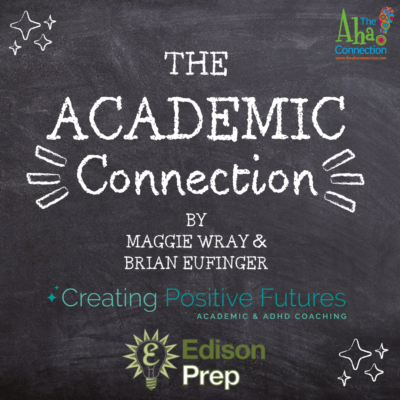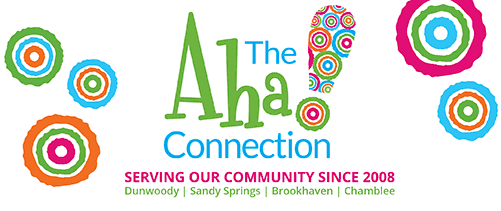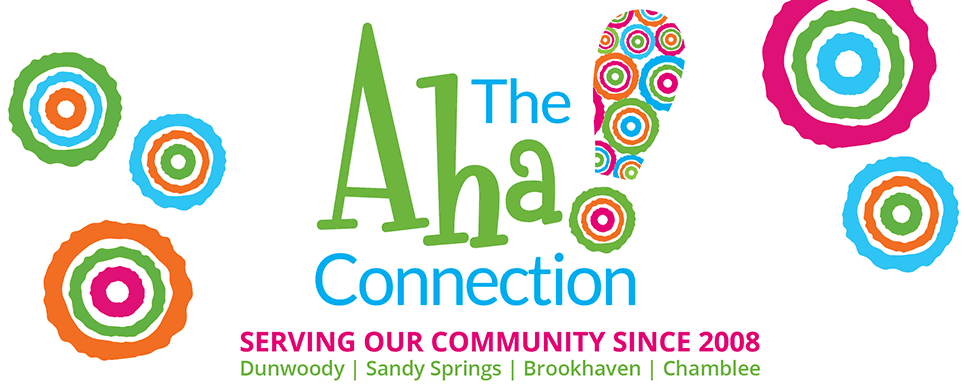 by Maggie Wray of Creating Positive Futures for The Aha! Connection
by Maggie Wray of Creating Positive Futures for The Aha! Connection
As Academic & ADHD Coaches, we have conversations every day with parents who suspect their student might have ADHD, or who have recently been diagnosed. In honor of ADHD Awareness Month coming up in a couple of weeks, I’d like to help clear up some of the most common misunderstandings we still hear about ADHD in our everyday conversations…
- Myth: “My kid is in high school / college…if they had ADHD, someone would have noticed it by now.”
Truth: Even though doctors, teachers, and parents are better at recognizing ADHD now than they used to be, we still talk to families every week who didn’t find out their child had ADHD until they were in their late teens or early 20’s. Despite the increased awareness of ADHD, there are still a lot of students falling through the cracks – especially girls, kids with higher IQs, and students with primarily inattentive (as opposed to hyperactive) ADHD. - Myth: “They can’t have ADHD, they’ve always gotten good grades.”
Truth: Many students with ADHD do well in school, especially early on. Some of them have high IQs, so they can grasp concepts quickly and get good grades on tests even though they struggle with focus and organization. Others maintain their grades by spending hours at home on assignments that take other students a fraction of that time to complete. In both of these cases, it’s entirely possible for students who are getting good grades to also be struggling with ADHD. - Myth: “They can focus when they want to, so they don’t have ADHD – they’re just lazy.”
Truth: The name “Attention Deficit Hyperactivity Disorder” is misleading, because it suggests that people with ADHD don’t have the ability to focus, which is not true. They can focus, it’s just hard for them to regulate and shift their focus from one activity to another. It’s actually quite common for people with ADHD to get hyperfocused and spend hours on activities they find intrinsically interesting – especially if they are also novel, urgent, or highly stimulating. But when they try to make themselves do “non-preferred” activities that feel tedious, routine, or uninteresting, it can become almost impossible for them to stay focused and keep their mind from wandering off task. This can look a lot like “laziness” but is actually a symptom of ADHD. - Myth: “I’m struggling to stay focused, so I must have ADHD.”
Truth: Not necessarily! There are lots of reasons why people might appear to have ADHD when they actually don’t. There is a lot of overlap between the symptoms of sleep deprivation and ADHD, so chronically sleep-deprived kids may look and/or feel like they have ADHD. Students who struggle with focus and attention in class may turn out to have slow processing speeds or learning differences rather than ADHD. It’s also common for students to have a hard time focusing and initiating tasks when they are anxious or depressed. This is why it’s so important to see a qualified professional if you are concerned that your student might have ADHD to make sure you are are receiving an accurate diagnosis. - Myth: “I don’t want them to be at a disadvantage if their school finds out they have ADHD”
Truth: Some parents worry about getting their children tested because they’re concerned about what will happen if they’re labeled as having ADHD. The downside is that when students don’t understand why they’re struggling, they can end up with labels that are even more damaging, like “lazy” or “stupid”. Receiving an ADHD diagnosis can reduce shame, increase self-awareness, and help students develop the strategies they need to be successful. Sharing the diagnosis with their school can give students access to resources and accommodations they can use in class and on standardized tests, including in college and graduate programs. Parents who are concerned about college admissions may find it reassuring that the Americans with Disabilities Act (ADA) prohibits schools from discriminating against students with ADHD, and it is against the law for transcripts to state that students had an IEP or 504 plan. So, colleges won’t know your student had accommodations in high school unless you choose to tell them. - Myth: “If they get diagnosed with ADHD, we’ll have to put them on medication.”
Truth: Taking medication is a choice, not a requirement. If your student is diagnosed with ADHD, you can reach out to your pediatrician or a psychiatrist who specializes in ADHD to discuss the pros and cons of medication and see if it would be a good fit for them. In the meantime, taking other steps to help them cope with ADHD – including behavioral coaching, exercise, sleep, nutrition, and/or parent education – can help set them up for success in the future whether they decide to take medication or not.
Additional Resources
While a diagnosis of ADHD can feel overwhelming, there are lots of helpful resources available to help you navigate the process. Here are a few of our favorite links to send to families who want to learn more about ADHD…
- What is ADHD? explainer video from “How to ADHD”
- A great analogy for the ADHD brain, from Ned Hallowell
- ADDitude magazine
If you have any questions about how to support your student with ADHD or want to learn more about what ADHD coaching is and how it can help students succeed, we would be happy to talk with you anytime!
Feel free to email me at maggie@creatingpositivefutures.com or set up a time to connect on our website here
If you want more support – Free parent consultations for Aha! Connection subscribers

















